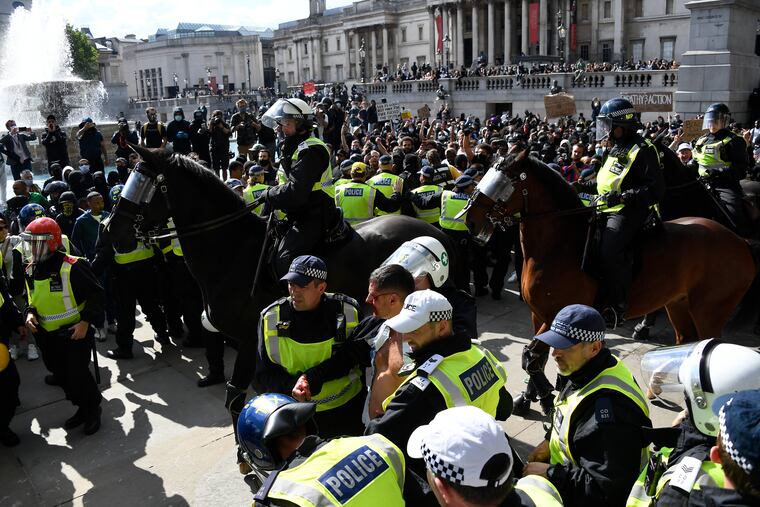More global protests emerge over racism, police actions
Tensions were high in cities around the globe, nearly three weeks after George Floyd, a black man, died after a white police officer pressed a knee to his neck. European protesters sought to express solidarity against police brutality and racism in the U.S. and to confront bias in their own countrie

Far-right activists scuffled with police and other protesters Saturday in London and Paris as more demonstrations in support of Black Lives Matter unfolded across Europe. In the U.S., a police shooting drew people to the scene where a man was killed outside an Atlanta fast-food restaurant.
Tensions were high in cities around the globe, nearly three weeks after George Floyd, a black man, died after a white Minneapolis police officer pressed a knee to his neck. European protesters sought to express solidarity with their American counterparts against police brutality and racism and to confront bias in their own countries. The demonstrations also posed a challenge to policies intended to limit crowds to prevent the spread of the coronavirus.
In Paris, police stopped protesters from confronting far-right activists who unfurled a huge banner from a building denouncing “anti-white racism.” The banner was partly torn down by residents in the building, with one raising a fist in victory.
A Black Lives Matter group in London called off a demonstration, saying the presence of counter-protesters would make it unsafe. Right-wing activists and soccer fans descended on the U.K. capital, saying they wanted to guard historical monuments that have been targeted by anti-racism protesters.
Many gathered around the statue of wartime Prime Minister Winston Churchill and the Cenotaph war memorial, which were boarded up Friday to protect them from vandalism. Officials feared far-right activists would seek confrontations with anti-racism protesters under the guise of protecting statues.
The statue of Churchill, who has long been revered for his World War II leadership, had been daubed with the words “was a racist.” Prime Minister Boris Johnson called Churchill a hero but acknowledged that he “sometimes expressed opinions that were and are unacceptable to us today."
Some activists threw bottles and cans at officers, while others tried to push through police barriers. The mostly white crowd chanted “England” and sang the national anthem while riot police on horses pushed them back.
Police fired tear gas and blocked people from marching through Paris to protest racial injustice. The rally, which drew 15,000, was led by supporters of Adama Traore, a French black man who died in police custody in 2016. No one has been charged in his death.
An enormous portrait showed one face with images of Floyd and Traore. Banners strung between trees around Republique plaza bore the names of dozens of others who have died or suffered violence at the hands of French police.
Myriam Boicoulin, 31, who was born on the French Caribbean island of Martinique, said she marched because she wanted to be heard.
As a black woman living in mainland France, she said, “I’m constantly obliged to adapt, to make compromises, not make waves — to be almost white, in fact.”
“It’s the first time people see us,” Boicoulin said. “Let us breathe.”
In the U.S., police said a 27-year-old man whose car was blocking a Wendy's restaurant drive-thru was fatally shot late Friday after resisting Atlanta officers. The Georgia Bureau of Investigation said it was investigating reports that Rayshard Brooks failed a sobriety test and was shot while in a struggle over a police Taser. A small crowd gathered to protest.
Stacey Abrams, the Georgia Democrat who gained national prominence running for governor in 2018, tweeted Saturday that “sleeping in a drive-thru must not end in death.” The Fulton County prosecutor said the office's staff were quickly at the scene.
In Boston, Mayor Marty Walsh's staff said he was in favor of removing a statue of Abraham Lincoln standing before a freed black man, The Boston Globe reported. The statue depicts Lincoln with one hand raised above the kneeling man with broken shackles on his wrists. A petition with 5,000 signatures said the statue represents a black man “beneath someone else.”
Elsewhere, hundreds rallied in Prague for the second straight weekend in support of protests in the U.S. Under occasional rain, they chanted “black lives matter,” “no justice, no peace” and “no Trump, No KKK, no fascist U.S.A.” The event was organized by an informal group of Americans living in Prague, along with several Czech groups.
The threat of rain and lack of a permit cut the size of crowds in Perth, the capital of Western Australia, but an estimated 5,000 people still turned out to honor Floyd and remember indigenous Australians who have died in custody.
Western Australia state Premier Mark McGowan had urged organizers to postpone the event, citing health risks. A man in his 30s who attended a rally in Melbourne last weekend tested positive for the coronavirus, raising concerns about a potential second wave of infections in Australia.
Hannah McGlade, a human rights lawyer and activist, rejected McGowan's request and called for an independent investigation into indigenous deaths.
"They told us not to come. They told us to be silent. We will not be silent,” McGlade said.